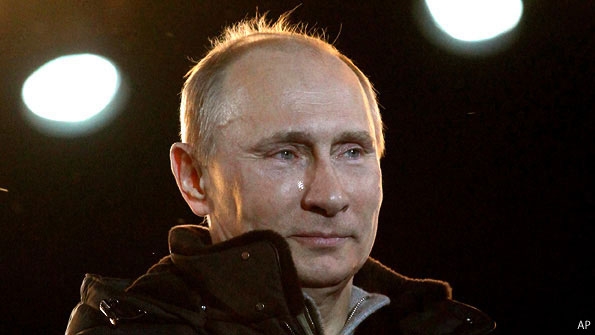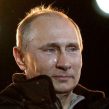
Putin’s Chain of Bad Choices Is Set to Continue After the Elections
Publication: Eurasia Daily Monitor Volume: 9 Issue: 45
By:

There is hardly much space for doubt about the outcome of the presidential elections in Russia: Every administrative resource was mobilized and every propaganda tool was deployed to ensure the victory of the “irreplaceable” Vladimir Putin. There is, however, a lot of doubt about the further trajectory of the political crisis in Russia – starting with the size and intensity of the protest rally on Monday afternoon that Moscow mayor Sergei Sobyanin has granted permission to gather, after much acrimonious negotiations, on the Pushkinskaya square (Novaya Gazeta, March 2). Putin expects the protest activity to run out of steam and political stability to re-emerge on the basis of steady economic growth (Nezavisimaya Gazeta, March 1). Urban middle classes, heavily concentrated in Moscow, have found so much liberating joy in the street politics that further growth of opposition to Putin’s ancien régime appears to be in the cards. These trends are not necessarily clashing, and compromises could be worked out (Vedomosti, March 2). What casts a deep shadow over this common sense perspective is the track record of bad decisions aggravated by tactical mistakes that Putin has made in the course of the election campaign.
The first of these bad decisions was the claim for getting back the presidential power underpinned by Putin’s mistrust in Medvedev’s experiments with “modernization” and his rhetoric of liberal political reforms. The mistake that magnified the fault of that decision was the pompous presentation of Putin’s claim at the United Russia party congress and the revelation that the deal inside the “tandem” had been made before Dmitri Medvedev started his failed presidency. The second bad decision was not to bother about the damaged reputation of United Russia and to secure its victory in the parliamentary elections through the well-tested methods of falsifications. The shameless fraud in Moscow’s polling stations aimed at proving Sobyanin’s effectiveness was a mistake that backfired in the first unexpectedly massive protest rally in Bolotnaya Square (Kommersant-Vlast, February 27).
The decision to dismiss the demands of the “white opposition” and to stage massive rallies of Putin’s ‘fans’ was bad because the majority of discontented Muscovites was ready for a dialogue and the political rule of thumb dictated steps aimed at dividing this leaderless camp. The very crude mistake that doubled the numbers in the second rally on Sakharova Avenue was the insulting of protesters and implicating them in taking money from US State Secretary Hillary Clinton (Ezhednevny Zhurnal, February 29). The last bad decision was ensuring Putin’s overwhelming victory in the first round instead of accepting a split vote and then comfortably defeating the veteran also-ran Communist Gennady Zyuganov in the second. This choice for “winning ugly” became a major blunder due to the shift to an aggressive and confrontational rhetoric in the final stretch of the race where Putin sought to mobilize the “common people” against the urban “cosmopolitans” (Nezavisimaya Gazeta, Vedomosti, February 27). Blunt accusations from Putin’s electoral team that the opposition was preparing for violent provocations and even a hit on a “sacrificial victim” multiplied the impact of this mistake. Meanwhile, the disclosure of the “special operation” that allegedly thwarted an assassination plot on Putin’s life further poisoned the atmosphere (Moskovsky Komsomolets, March 2).
The sequence of turns toward explicit authoritarianism has a clear logic but it was the characteristically personal mistakes that made each next strategic choice all but pre-determined. The questions that loom large over the days and weeks immediately after election day are where this trend is going and what mistakes could precipitate further degeneration of the fluid crisis. One firmly chartered course is the expansion of state control over the economy, and Putin is about to discover that militarization is a driver not of growth but of stagnation (Gazeta.ru, February 27). The mistake associated with this bad policy is the election period freeze on gas and electricity prices that must be lifted by summer, bringing a spike in communal costs and in inflation (Moskovskie Novosti, March 2). The current wave of protests has no economic content aside from the painful reminder that the period of prosperity is over and the souring of business expectations might deepen the pool of discontent.
The decision to put a forceful end to the street “disorder” is looming over the Kremlin, and it would be so bad that a significant part of the ruling elite might desert following the example of former finance minister Aleksei Kudrin (Moskovskie Novosti, March 1). Medvedev, who formally remains in charge for the next three months, is clearly reluctant to take responsibility for any repression. This provides an opportunity for the opposition to get its act together, adopting a strategy of peaceful regime change as outlined by Mikhail Khodorkovsky, who monitors the situation from his prison camp (Gazeta.ru, March 2). There is no future for Putin in this plan for a constructive dismantlement of his corrupt regime, and many of his courtiers have high-value reasons to move resolutely against any reforms so that no opening is given to the “enemy” (New Times, February 27). This aggressive counter-offensive fits Putin’s own instincts, shaped by a fear of showing weakness, so he is prompted and tempted to commit the gravest of mistakes of ordering a crackdown on a “carnival” (Nezavisimaya Gazeta, March 2).
Putin’s war-like campaign has escalated tensions to a breaking point, and many of his “fans” are ready to take literally his appeals to crush the “traitors,” while others could be ready to force his hand by staging a provocation. An ideal instrument for triggering a blood-bath is a band of Kadyrovtsy that could be easily smuggled to Moscow in order to provoke an OMON unit – each of them has a long history of deployment to the North Caucasus – to use the most brutal technique of “crowd control.” One violent clash would not re-establish the “fear factor” as a deterrent of street protests but could make Putin desperate to re-assert control over the self-propelling crisis. He does not understand where the opposition has come from and what it is about; his inability to evaluate his own mistakes invites new blunders; and he is poised to turn the bad start of his new presidency into a fast failure.




